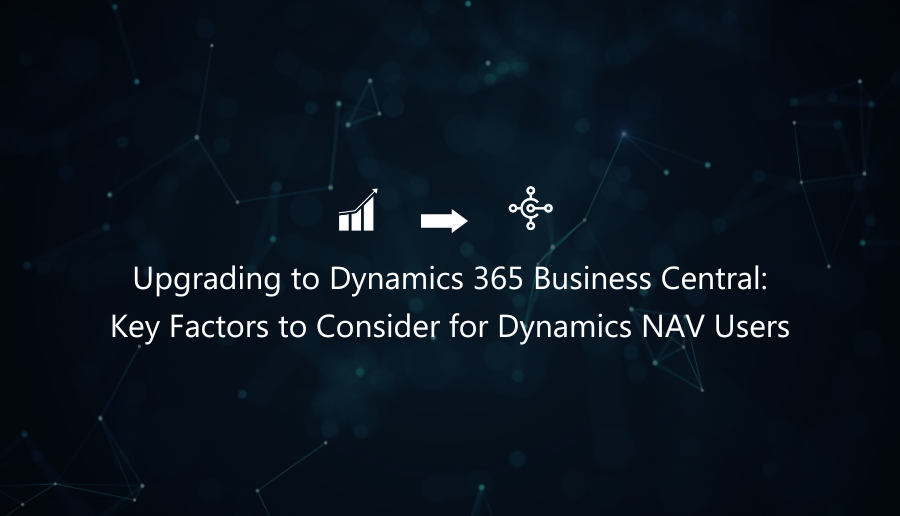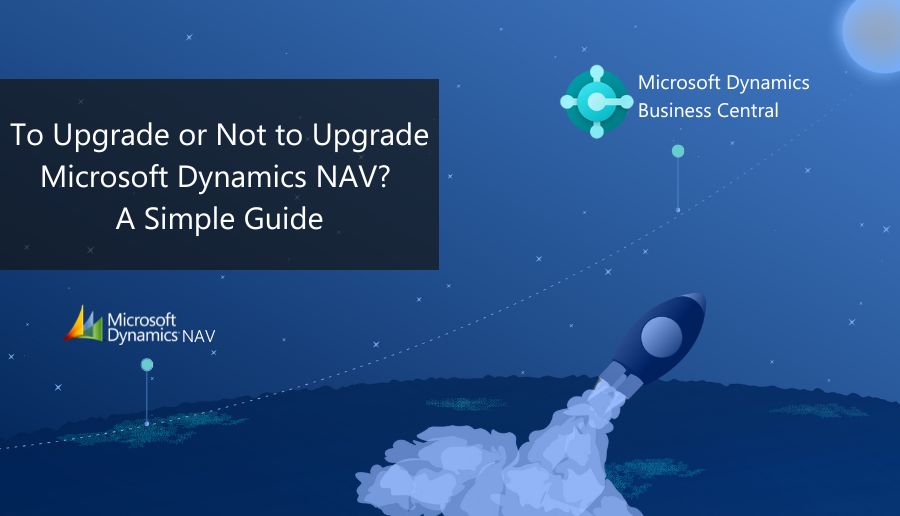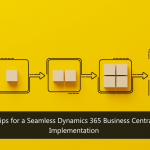Fueling business success requires efficient and effective operations. So, Enterprise Resource Planning (ERP) systems have become vital in streamlining processes and empowering informed decisions.
Microsoft Dynamics NAV and Dynamics 365 Business Central stand out as popular ERP solutions, but what distinguishes them?
Microsoft Dynamics NAV is an on-premise ERP solution that assists businesses in managing their finances, supply chain, and operations. In contrast, Dynamics 365 Business Central is a cloud-based solution combining the best Microsoft Dynamics NAV and other Microsoft products into a single platform.
Both systems provide comparable functionality, but significant differences exist in deployment, user interface, and integration with other systems.
Key Differences Between NAV and Business Central
The differences between Microsoft Dynamics NAV and Dynamics 365 Business Central are varied. Here are some of the key ones:
- Features: Dynamics 365 Business Central offers more comprehensive features than Microsoft Dynamics NAV. It includes advanced reporting capabilities, such as Power BI integration, project management, and human resource management, unavailable in NAV.
- Deployment options: Dynamics 365 Business Central is cloud-based, whereas Dynamics NAV is installed on-premise. Businesses can use Business Central to access their ERP system from any location with an internet connection. Dynamics NAV, on the other hand, necessitates on-premise installation and maintenance.
- User interface: Business Central has a more modern and intuitive user interface than Dynamics NAV. The new interface provides a more user-friendly experience, making it easier for users to navigate and find the information they need.
- Integration with other systems: Dynamics 365 Business Central is integrated with other Microsoft products such as Office 365, Power Apps, and Power Automate to simplify data sharing and workflow automation. This integration also aids in the elimination of data silos and the increase of productivity.
- Licensing and pricing: Dynamics 365 Business Central offers a more cost-effective licensing model than Dynamics NAV, making it more accessible for businesses of all sizes. The pricing model is based on the number of users and the features they need, making it easier for companies to find the right solution for their needs.
Comparison of NAV and Business Central in Terms of Functionality
Microsoft Dynamics NAV and Dynamics 365 Business Central are two popular ERP systems. In terms of functionality, here’s how they compare.
- Accounting and Financial Management: Both systems offer robust accounting and financial management capabilities. However, Business Central takes it further by offering advanced reporting and analysis capabilities through its integration with Power BI, providing businesses with in-depth insights into their financial data.
- Sales and Purchasing Management: Both systems offer efficient sales and purchasing management features such as order management, invoicing, and inventory control. Business Central provides a more user-friendly interface, making it easier for users to manage their sales and purchasing operations.
- Inventory and Supply Chain Management: The two systems provide comprehensive inventory and supply chain management capabilities. Business Central offers greater flexibility by allowing businesses to track and manage their supply chain from anywhere, at any time, using any device.
- Project Management: Both systems offer robust project management features, including project planning, tracking, and reporting. Business Central, however, provides greater visibility into project performance and resources, allowing businesses to make informed decisions and improve their project outcomes.
- Human Resource Management: The two systems offer basic human resource management features. However, Business Central provides advanced features such as performance management, compensation planning, and talent management, enabling businesses to manage their human resources more effectively and drive their business forward.
Benefits of Microsoft Dynamics 365 Business Central
Microsoft Dynamics 365 Business Central offers several benefits to businesses of all sizes. These benefits include:
1. Cloud Deployment
Business Central is a cloud-based solution that offers more flexibility and accessibility than Dynamics NAV. Businesses that use cloud computing can access their data and applications from any location with an internet connection. This eliminates the need for on-premise installation and the associated IT infrastructure costs.
2. Improved User Interface
Business Central has a more modern and intuitive interface than Dynamics NAV, making it easier for users to work with. This enhanced user experience boosts productivity, streamlines processes, and allows employees to find the information they require quickly.
3. Advanced Reporting
Business Central offers advanced reporting capabilities, including Power BI integration. This enables businesses to create customized reports, visualize data in novel ways, and make sound decisions. Companies can access deeper data analysis and insights with these advanced reporting capabilities.
4. Greater Integration
Business Central integrates seamlessly with Microsoft products, such as Office 365, Power Apps, and Power Automate. This integration makes sharing data easier and automates workflows, reducing manual effort and improving data accuracy.
5. Mobile Access
Business Central offers mobile access through its app, allowing users to access critical information and perform tasks on the go. This mobile accessibility provides greater flexibility and helps businesses stay connected and productive, even when they are away from the office.
6. Regular Updates
Business Central is updated regularly with new features and functionality, providing customers with a constantly evolving solution. With these regular updates, businesses can take advantage of new capabilities and use the latest technology to drive their success.
7. More Cost-Effective
Business Central offers a more cost-effective licensing model than Dynamics NAV, making it more accessible for businesses of all sizes. With this cost-effective licensing model, companies can take advantage of the latest technology without breaking the bank.
8. Easy Migration
Business Central provides an easy migration path for customers already using Dynamics NAV, helping minimize disruption and downtime. This easy migration process helps ensure a seamless transition to the new platform and reduces the impact on business operations.
Upgrade to Dynamics 365 Business Central Today
Microsoft Dynamics NAV and Dynamics 365 Business Central are powerful enterprise resource planning systems that provide a wide range of business solutions. However, the two systems differ in features, deployment, user interface, integration, pricing, and scalability.
Business Central is the ideal choice for businesses seeking to upgrade their ERP system with its numerous advantages, such as cloud deployment, an improved user interface, greater integration, regular updates, and easy migration.
A Microsoft Partner like TMC can help minimize disruption and downtime during the upgrade process and ensure a smooth transition to the new solution.
Contact us today to help you jumpstart your digital transformation with Microsoft Business Solutions.








